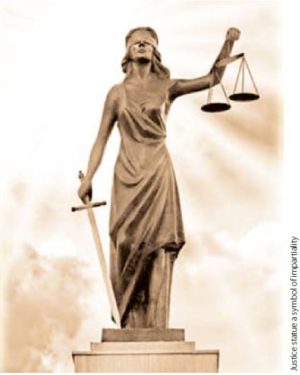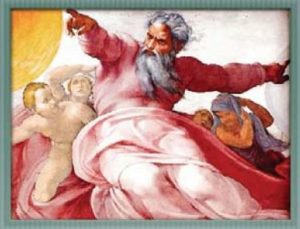© 2016 Marc Belleau
© 2016 International Urantia Association (IUA)
| Journal Editorial – February 2016 | Journal — February 2016 — Index | Reflections for Teachers and Believers in the Fifth Epochal Revelation |

There is a belief, well spread in many religious movements, stating that the tribulations we experience through the course of our terrestrial life have been sent by God to put us on trial and help us progress in spirituality. Humanity has always attributed to some celestial personalities the account for the extra-ordinary events of life, especially those for which we have no control or explanation. I often heard my grand-mother say, when someone would die, that God needed him on the other side. But let us ask ourselves this simple question: would our celestial father send sickness to one of his children so as to have him gain compassion, or put a powerful man in bankruptcy to have him understand what humility is? Imagine, for example, that a terrestrial father burns the fingers of his child to make him understand that he should not play with fire. No intelligent being would do such a thing and I think it is the same with God. Never does the celestial father voluntarily send calamities to test and aggrandise his creation. God is not a tyrant!
It is our personal and collective decisions, coupled with the accidents of time, which entail the consequences through which we have to struggle. Personal decisions are those that we have the most control over. For example, we can decide to not physically exercise regularly but this augments the risk of aging with handicaps. Collective decisions are constituent of the orientations we indulge in as a society and which has influence on the fate of each individual. Generally speaking, we have less control on these decisions. For example, the latitude given to the fuel industry by our governments leads us to worldwide disruptions. We can cast an arbitrary vote on these political parties who favor such action, but when such people are elected by majority, the planet as a whole suffers from the consequences. And finally, there are the accidents of time on which we have no control. My mother suffered from macular degeneration. Upon aging, her eyesight diminished to that of semi-sighted. She is not personally responsible for this situation. She was just born with less performing eyes; it’s a genetic factor.
…“The Father in heaven does not willingly afflict the children of men. Man suffers, first, from the accidents of time and the imperfections of the evil of an immature physical existence. Next, he suffers the inexorable consequences of sin — the transgression of the laws of life and light. And finally, man reaps the harvest of his own iniquitous persistence in rebellion against the righteous rule of heaven on earth. But man’s miseries are not a personal visitation of divine judgment…” [UB 148:6.11]
It is not the Father’s intention to torment his creation for any thinkable reason. The previous quote teaches us a bit more on the origin of our terrestrial tribulations. The consequences of our choosing are a product of three different causes:
- Our imperfection: immaturity, the lack of judgement, knowledge and experience.
- The inescapable consequences of sin: the transgression of divine laws. We are aware of things we should not do, we have sufficient insight to make the right decisions but we none-the-less choose the wrong path, whether it be by laziness, procrastination, cowardice, or any other weakness.
- Rebellion against the sovereignty of heaven: it is the love of what is evil. When we repeatedly choose to do wrong, we make a habit of it and our vision on reality is distorted. Instead of blending with God—source of reality, we come to akin with evil which is vowed to vanish in its time.
The trials in our life are direct consequences of the transgression of divine laws. We all know the famous saying: “The act is ours, the consequences God’s.” And so the universe may effectively function we must establish the rules that individuals must submit to. Should it be otherwise, it would be anarchy and chaos. These rules allow knowing the rights and the limits of liberty of each member of the group, their function and the authority they may make use of, etc. When we transgress these rules voluntarily or by lack of experience, we receive the kickback attached to them. The management of the laws which govern the universe of universes is in the hands of the Paradise Trinity.
All law takes origin in the First Source and Center; he is law. The administration of spiritual law inheres in the Second Source and Center. The revelation of law, the promulgation and interpretation of the divine statutes, is the function of the Third Source and Center. The application of law, justice, falls within the province of the Paradise Trinity and is carried out by certain Sons of the Trinity. [UB 16:6.1]
In Greco-Roman mythology, justice is personified by Methis, a woman holding a scale and whose eyes are covered with a headband, a symbol of impartiality. This illustration says much on the nature of justice. Indeed, she presents the facts in open light without consideration of the individual. She does not seek to understand the motives of the concerned party; this role being rather attributed to Mercy. Justice oversees the rules to be applied; it assures harmony among the whole by regulating the individual. It is always managed by groups of personalities.
Justice is inherent in the universal sovereignty of the Paradise Trinity, but goodness, mercy, and truth are the universe ministry of the divine personalities, whose Deity union constitutes the Trinity. Justice is not the attitude of the Father, the Son, or the Spirit. Justice is the Trinity attitude of these personalities of love, mercy, and ministry. No one of the Paradise Deities fosters the administration of justice. Justice is never a personal attitude; it is always a plural function. [UB 10:6.2]
Although justice is precise and efficient it is always tempered through divine mercy. In his personal relationship with each of his creatures, God as a father does not judge his children. Upon death, our Adjusters do not decree our survival, this rather is in the hands of three Stationary Sons: a Universal Sensor, a Perfector of Wisdom and a Divine Counselor; this judicial trio operates at the constellation level and is the perfect judgement of the Paradise Trinity. While justice is an administrative function managed by groups of personalities, mercy is always an individual and personal attitude.
“…Mercy ministry is always the work of the individual, but justice punishment is the function of the social, governmental, or universe administrative groups. As an individual I am beholden to show mercy…’’ [UB 133:1.2]

The celestial Father is merciful because he personally and intimately knows the course of each of his children. This knowledge permits him to judge, in all fairness, the happenings within his universe. This same mercy is expressed through the attitude of the Thought Adjusters as they bear the consequences of our most foolish actions and, in reality, they do more than that. Using the consequences of our mistakes, and to the extent that we accept to reflect on our experience, they teach us the right way and the better path. In more down to earth terms, we put our feet in the dish and the Adjuster utilises these occurrences to develop our character and personality; but in any case the Father does not send trials to his progeny! In reality, he has no need to do so since we are fully capable of entangling ourselves in tight situations without any external help. Do we really need to believe that God sends us additional challenges to top the mistakes we are already making?
The Adjusters make a wise and positive use of these life experiences which to us sometimes seem recurrent. But isn’t that one of the loveliest expressions of divine intelligence, a habit of God transforming the errors of his children into opportunities of apprenticeship and growth? Let’s think of the rebellion that took place in our constellation. Our celestial Father, with sagacity, presently utilises the outcome (isolation of the planet, absence of the Planetary Prince’s government, and the cultural quarters of the planetary Adam and Eve) in liaison with the rebel sinners involved in this apparent catastrophe, while preparing and forming creatures with unshakeable faith, beings that will function in conditions where sublime confidence in divine providence is required to succeed. Our celestial Father has the power to transform evil into something much grander, nobler and more beautiful. In his image, we too can do the same. Choosing to learn from our trying times allows us to grow while giving us the feeling that we control our lives. We do not have to bear the consequences of our errors; we can learn to use them.
Teaching that catastrophes, sickness and any tribulation we encounter within our life span are sent by the celestial Father with the intent of affirming our character is to make him responsible for everything happening to us. In doing so, we project a false image of the loving character of our celestial Father. God certainly uses our misjudgements to help us grow, but never and for any reason does he cast trials to his children. Our imperfection and immaturity are amply sufficient to supply us with all the trying times we are to face during our existence. However, we can learn to use our mistakes as multiple springboards toward higher levels of wisdom.
“…All too often there has prevailed a tendency to ascribe to God the responsibility for everything which ignorant man fails to understand. The Father is not personally responsible for all you may fail to comprehend. Do not doubt the love of the Father just because some just and wise law of his ordaining chances to afflict you because you have innocently or deliberately transgressed such a divine ordinance.’’ [UB 148:5.4]
¶ References
| Journal Editorial – February 2016 | Journal — February 2016 — Index | Reflections for Teachers and Believers in the Fifth Epochal Revelation |